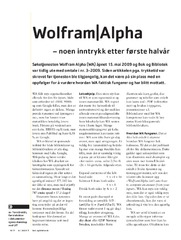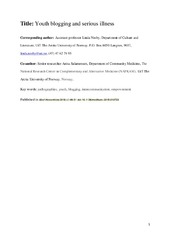Blar i tittel Artikler, rapporter og annet (språk og kultur)
Viser treff 1317-1336 av 1358
-
Why prefixes (almost) never participate in vowel harmony
(Journal article; Tidsskriftartikkel; Peer reviewed, 2020-11-06)One of the most common ways of morphological marking is affixation, morphemes are classified according to their position. In languages with affixal morphology, suffixes and prefixes are the most common types of affixes. Despite several proposals, it has been impossible to identify solid generalisations about the behaviour of prefixes, in opposition to suffixes. This article argues that the reason ... -
With great power comes great responsibility: why ‘safe enough’ is not good enough in debates on new gene technologies
(Journal article; Tidsskriftartikkel; Peer reviewed, 2022-10-25)New genomic techniques (NGTs) are powerful technologies with the potential to change how we relate to our food, food producers, and natural environment. Their use may afect the practices and values our societies are built on. Like many countries, the EU is currently revisiting its GMO legislation to accommodate the emergence of NGTs. We argue that assessing such technologies according to whether ... -
Witnessing Extremity in Violent Narratives in Literature and Humanitarian Discourse
(Chapter; Bokkapittel, 2023)Beginning with Heidegger´s definition of violence as that which exceeds and reformulates normality, this essay questions how violence can be ethically represented and interpreted. In their ability to establish norms and then carry us beyond the bounds of the familiar, novels are uniquely suited to represent violence as norm-shattering. Contrasting tendencies in contemporary novels representing ... -
Wolfram|Alpha – noen inntrykk etter første halvår
(Journal article; Tidsskriftartikkel, 2009) -
Word order and finiteness in acquisition: A study of English and Norwegian wh-questions
(Chapter; Bokkapittel, 2016-08-25)Children acquiring languages such as English, German or Dutch typically go through a phase where they produce non-finite root clauses, often referred to as the Optional Infinitive (OI) stage. But there is a difference between English on the one hand and the other Germanic languages on the other with respect to the occurrence of non-finite wh-questions: while there is a high number of OIs in English ... -
Word order in wh-questions in a North Norwegian dialect: some evidence from an acquisition study
(Journal article; Tidsskriftartikkel; Peer reviewed, 2003)While standard Norwegian is a V2 language, some Norwegian dialects exhibit V3 in certain types of wh-questions. In some previous work on the Tromsø dialect, V3 has been considered the ‘true’ dialect and speakers' acceptance of V2 simply a result of the influence from the standard language. Based on child and adult data from a study of the acquisition of word order in the Tromsø dialect, I will argue ... -
Word order variation in heritage languages: Subject shift and object shift in Norwegian
(Chapter; Bokkapittel, 2020-05-29)This study investigates two word order phenomena in Norwegian heritage language spoken in the US, subject shift (SS) and object shift (OS). SS and OS occur in syntactic environments where (pronominal) subjects and objects may either precede or follow negation. This paper explores to what extent these two phenomena in Heritage Norwegian are affected by the factors frequency and structural ... -
Word reading in monolingual and bilingual children with developmental language disorder
(Journal article; Tidsskriftartikkel; Peer reviewed, 2022-08-11)Many children with developmental language disorder (DLD) are reported to have word reading difficulties. However, previous research has focused mostly on monolingual children. The present study used two existing datasets to assess word reading outcomes of bilingual children with DLD. In Study 1, we compared word reading outcomes of monolingual and bilingual children with and without DLD (n = 93 ... -
Words as archaeological objects: A study of marine lifeways, seascapes, and coastal environmental knowledge in the Yagan‑English dictionary
(Journal article; Tidsskriftartikkel; Peer reviewed, 2024-02-21)Reverend Thomas Bridges’ Yagan-English dictionary (1879) has hitherto been little explored outside of linguistics but is highly valuable as a complementary source to archaeological, ethnohistorical, and ethnographic records in Tierra del Fuego (Argentina and Chile). The dictionary contains 22,800 entries and yields rich information concerning the marine lifeways of the Yagan and their and ... -
Work of a Slavist as an Example of Scientific Diplomacy: Olaf Broch’s Epistolary Legacy
(Conference object; Konferansebidrag, 2018)<p>2017 marked 100 years since the October Revolution, the consequences of which are well known to everyone. 100 years ago Olaf Broch wrote to Aleksey Aleksandrovich Shakhmatov: «No matter how turbulent the times are, we should not forget about people, about individuals.»1 It is these words that contain the main idea of this article that shows Broch not only as a researcher, linguist and dialectologist ... -
Workplace Multilingualism in Shifting Contexts: A Historical Case
(Journal article; Tidsskriftartikkel; Peer reviewed, 2017-10-17)This article investigates linguistic diversity, migration, and labour in the case of a nineteenth-century copper mine in the multilingual northern periphery of Norway. Taking a historical perspective on workplace multilingualism, it reveals the dynamic relationships between the economic interests and policy-making of an industrial enterprise and the political and sociolinguistic development in a ... -
‘You are Iranian even if you were born on the moon’: family language policies of the Iranian diaspora in the UK
(Journal article; Tidsskriftartikkel; Peer reviewed, 2021-06-08)With a focus on an under-studied group of immigrants in the UK, this paper examines Iranian families’ language ideologies and practices at home in relation to Persian acquisition and maintenance for their children. Working within a family language policy (FLP) framework, we draw on sociolinguistic data from semi-structured interviews with eighteen mothers to understand how parental beliefs, their ... -
You can’t fix what is not broken: Contextualizing the imbalance of perceptions about heritage language bilingualism.
(Journal article; Tidsskriftartikkel; Peer reviewed, 2021-04-29)In this article, we discuss the perceptions of researchers who work on heritage language bilingualism (HLB), educators who teach heritage speakers (HSs), and, crucially, HSs themselves regarding the nature of bilingualism in general as well as HLB specifically. Despite the fact that all groups are invested in HLB and that researchers and educators tend to have a similar basic understanding of HLB ... -
You can’t suggest that?! Comparisons and improvements of speller error models
(Journal article; Tidsskriftartikkel; Peer reviewed, 2022-08-30)In this article, we study correction of spelling errors, specifically on how the spelling errors are made and how can we model them computationally in order to fix them. The article describes two different approaches to generating spelling correction suggestions for three Uralic languages: Estonian, North Sámi and South Sámi. The first approach of modelling spelling errors is rule-based, where ... -
Youth blogging and serious illness
(Journal article; Tidsskriftartikkel; Peer reviewed, 2015-12-15)In recent years, a growing number of young people who experience illness tend to blog about it. In this paper, we question whether and how illness blogs illustrate the intercommunicative aspect of blogging by bringing forth both the literary concept of the implied reader and the sociological concepts of empowerment and agency in the analysis. We argue that young people blogging about serious illness ... -
Zametka ob "Admiraltejstve" Osipa Mandel'stama
(Journal article; Tidsskriftartikkel, 2007)Om O. Mandel'stam og Andrej Belyj -
Zasmotrite i zacenite : produktivnost’ pristavki ZA- v sovremennom russkom jazyke
(Journal article; Tidsskriftartikkel, 2009) -
Zero nouns with and without objects
(Journal article; Tidsskriftartikkel; Peer reviewed, 2012)One of the main topics on the study of the relationship between syntax and morphology is (deverbal) nominalizations. In this area, several generalizations that tie the morphological make-up with the syntactic structure have been made. Most relevantly, it has been argued that only overt nominalizations (those that include a nominalizer like -ation or -ment) are allowed to have internal arguments ... -
Zhitie Feodora Studita v avtografe Nila Sorskogo
(Journal article; Tidsskriftartikkel, 2012) -
Zhizn' na grani vyzhivanija. Zametki o tvorchestve Jurija Rytcheu
(Journal article; Tidsskriftartikkel; Peer reviewed, 1999-02-01)The Chukotian writer Yuri Rytkheu, born in 1930, is the author of a large number of books, all of them dealing with the hard life of the small indi- genous people to which he belongs. The last century has seen two im- portant turning-points in this people's history: the establishment of Soviet power and its fall. Neither event has lead to an improvement of the situ- ation. The never-ending hardships ...


 English
English norsk
norsk


















